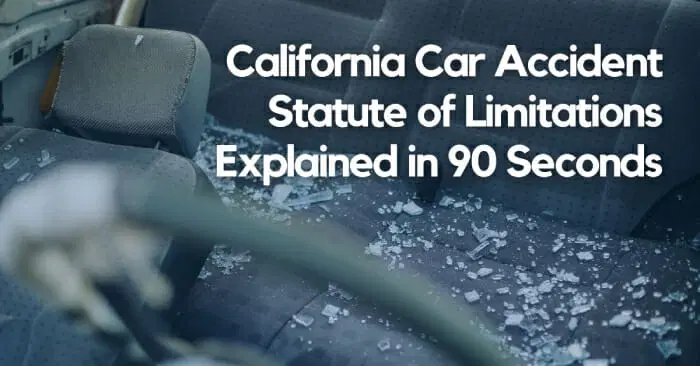
California Car Accident Statute of Limitations Explained in 90 Seconds
Legally reviewed by: Jessica Anvar Stotz, JD, MBA
Short answer: In most cases, the statute of limitations for personal injury claims arising from a car accident in California is generally two years from the date of the accident. This means you must file a lawsuit within two years of the accident if you wish to pursue a legal claim.
Long answer: In California, the statute of limitations for filing a lawsuit related to a car accident is typically governed by the California Code of Civil Procedure.
The statute of limitations sets a time limit within which a legal action must be initiated after an incident occurs. If the deadline passes, you may lose your right to file a lawsuit and seek compensation for your damages.
It’s important to note that statutes of limitations can vary based on the specific circumstances of the case. There may be exceptions or variations depending on factors such as the nature of the claim, the age of the individuals involved, the type of damages sought, and whether government entities are involved.
Exceptions to the Statute of Limitations for Car Accidents in California
Several issues can potentially affect the car accident statute of limitations in California. Here are a few common factors that could influence the timeframe:
- Discovery of injuries: Sometimes, injuries resulting from a car accident may not be immediately apparent. If you discover an injury or damage after the accident, the statute of limitations may start from the date of discovery rather than the date of the accident. This is known as the “discovery rule.”
- Minor or incapacitated individuals: If the accident involves a minor (someone under the age of 18) or an individual who is mentally incapacitated, the statute of limitations may be extended. The time limit may not begin until they reach adulthood or regain mental capacity.
- Government entities involved: If the accident involves a government vehicle or a government employee, special rules and procedures may apply. There could be shorter time limits for filing claims against government entities, such as a city, county, or state agency.
- Wrongful death claims: In cases involving a wrongful death resulting from a car accident, the statute of limitations may differ. It typically begins from the date of the person’s death rather than the date of the accident.
- Modified statutes of limitations: In certain situations, the statute of limitations may be modified by specific laws. For example, if the defendant in the car accident is a hit-and-run driver, different rules may apply.
- Lack of mental capacity: The lack of mental capacity can affect the car accident statute of limitations in California. If an individual involved in a car accident lacks mental capacity at the time of the incident, the statute of limitations may be tolled, meaning the time limit for filing a lawsuit is paused or delayed.
- Defendant bankruptcy: Defendant bankruptcy can potentially affect the car accident statute of limitations in California, although it does not necessarily pause or extend the statute of limitations on its own. When a defendant files for bankruptcy, an automatic stay is typically imposed, which temporarily halts most legal proceedings, including lawsuits.
- Property damage: The car accident statute of limitations can be different for property damage claims compared to personal injury claims in California. The general statute of limitations for property damage claims resulting from a car accident is three years from the date of the accident.
- Fraud or intentional misconduct: If the defendant engaged in fraudulent or intentional misconduct related to the car accident, it might be possible to extend the statute of limitations. In such cases, the clock may start ticking from the date the fraud or intentional misconduct was discovered or should have been discovered.

Can I Still File a Claim if the Deadline Has Passed?
In California, if the statute of limitations for filing a claim has passed, it generally means that the right to file a lawsuit or seek legal remedies for that particular claim is no longer available. Once the statute of limitations has expired, the defendant can raise it as a defense, and the court is likely to dismiss the claim.
When is the Best Time to File a Claim?
The best time to file a claim for a car accident is as soon as possible after the incident. Promptly filing a claim ensures compliance with the statute of limitations, preserves crucial evidence, allows for timely investigation, enhances witness recollection, and facilitates potential early resolution. Acting quickly and seeking legal advice promptly maximizes your chances of obtaining a favorable outcome and protecting your rights.
Is it Necessary to Have a Car Accident Lawyer to File a Claim in California?
While it is not legally required to have a car accident lawyer to file a claim in California, it is highly advisable to seek legal representation.
Car accident cases can be complex, involving insurance companies, liability assessments, and negotiations. A car accident lawyer has expertise in navigating the legal process, understanding relevant laws, assessing damages, and advocating for your rights.
They can gather evidence, handle paperwork, negotiate with insurance companies, and represent your interests in court if necessary. Having a lawyer increases your chances of obtaining fair compensation and ensures that your rights are protected throughout the claims process.

Get Connected with a Lawyer Today
If you were injured in a car accident and have questions about your situation, give LawLinq a call today. We connect injured victims with some of the best car accident lawyers in California.
Our service is completely free for people in California accidents. We know searching for a lawyer isn’t fun. That’s why we’re here. Don’t hesitate, call LawLinq to get connected with an accident lawyer that’s good for your case.


